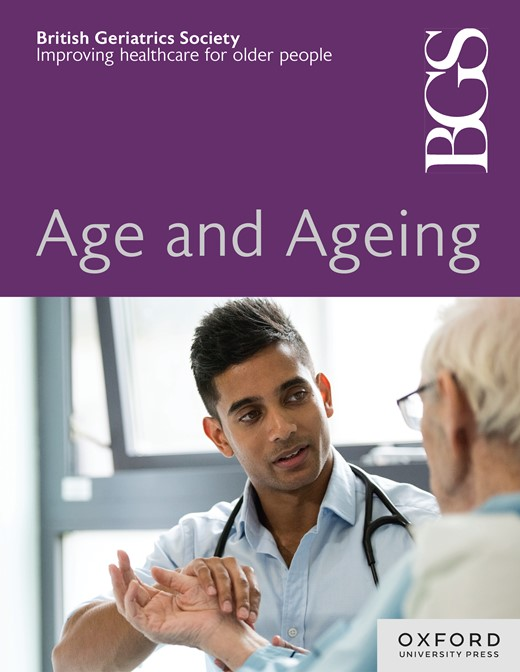Targeting oral frailty indicators of late-life cognitive disorders and depression: a systematic review.
IF 6
2区 医学
Q1 GERIATRICS & GERONTOLOGY
引用次数: 0
Abstract
BACKGROUND Oral frailty is an age-related gradual loss of oral function together with a cognitive and physical function decline. Previous systematic reviews and meta-analyses examined the association of some oral frailty indicators with late-life cognitive and late-life depression (LLD). However, none of these studies investigated a large series of possible indicators and outcomes. OBJECTIVE To clarify the impact of oral frailty indicators on late-life cognitive disorders and LLD. DESIGN Systematic review. SUBJECTS Sixty-three studies (56,520,662 subjects) with 11 oral frailty indicators in four categories: (i) oral health status deterioration, (ii) decline in oral motor skills, (iii) chewing, swallowing, and saliva disorders, and (iv) oral pain. METHODS From database inception to April 24, 2024, six different electronic databases were consulted by two independent researchers assessing the eligibility of 24,045 records against the inclusion criteria and found 63 studies fitting the eligibility requirements. The protocol was registered a priori with PROSPERO (CRD42021249428). RESULTS Four oral frailty indicators (number of remaining teeth, periodontal disease, difficulties in chewing, and difficulties in swallowing) were associated with late-life cognitive impairment/decline, mild cognitive impairment (MCI), dementia, and LLD. Among categories, oral health status deterioration and chewing, swallowing, and saliva disorders were associated with late-life cognitive impairment/decline, MCI, dementia, and LLD. Decline in oral motor skills was associated with late-life cognitive impairment/decline, while oral pain was related only to LLD. CONCLUSION Certain oral frailty indicators may contribute to the development of late-life cognitive disorders and LLD.针对老年认知障碍和抑郁症的口腔虚弱指标:系统综述。
背景:口腔虚弱是一种与年龄相关的口腔功能逐渐丧失,同时伴有认知和身体功能下降。以前的系统综述和荟萃分析研究了一些口腔虚弱指标与晚年认知和晚年抑郁(LLD)的关系。然而,这些研究都没有调查大量可能的指标和结果。目的探讨口腔衰弱指标对老年认知障碍和LLD的影响。DESIGNSystematic审查。受试者:63项研究(56,520,662名受试者),涉及11项口腔虚弱指标,分为四类:(i)口腔健康状况恶化,(ii)口腔运动技能下降,(iii)咀嚼、吞咽和唾液紊乱,以及(iv)口腔疼痛。方法自数据库建立至2024年4月24日,两名独立研究人员查阅了6个不同的电子数据库,根据纳入标准评估了24045条记录的合格性,发现63项研究符合资格要求。该协议在PROSPERO (CRD42021249428)进行了先验注册。结果4项口腔虚弱指标(剩牙数、牙周病、咀嚼困难和吞咽困难)与老年认知功能障碍/下降、轻度认知功能障碍(MCI)、痴呆和LLD相关。在分类中,口腔健康状况恶化、咀嚼、吞咽和唾液障碍与晚年认知障碍/下降、轻度认知障碍、痴呆和LLD相关。口腔运动技能的下降与老年认知障碍/衰退有关,而口腔疼痛仅与LLD有关。结论某些口腔虚弱指标可能与老年认知障碍和LLD的发生有关。
本文章由计算机程序翻译,如有差异,请以英文原文为准。
求助全文
约1分钟内获得全文
求助全文
来源期刊

Age and ageing
医学-老年医学
CiteScore
9.20
自引率
6.00%
发文量
796
审稿时长
4-8 weeks
期刊介绍:
Age and Ageing is an international journal publishing refereed original articles and commissioned reviews on geriatric medicine and gerontology. Its range includes research on ageing and clinical, epidemiological, and psychological aspects of later life.
 求助内容:
求助内容: 应助结果提醒方式:
应助结果提醒方式:


